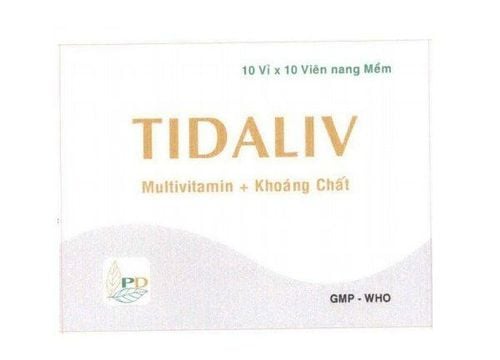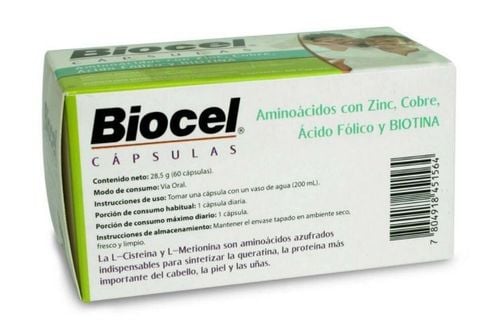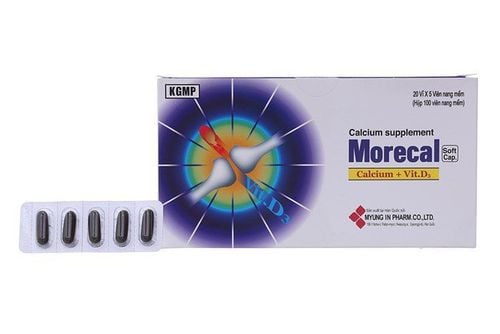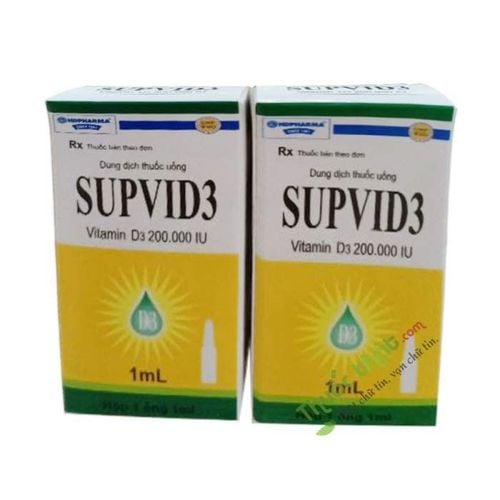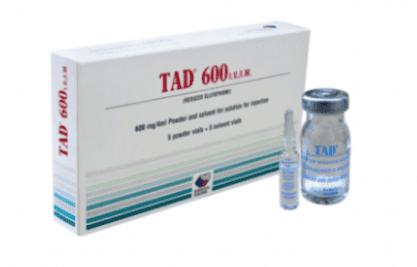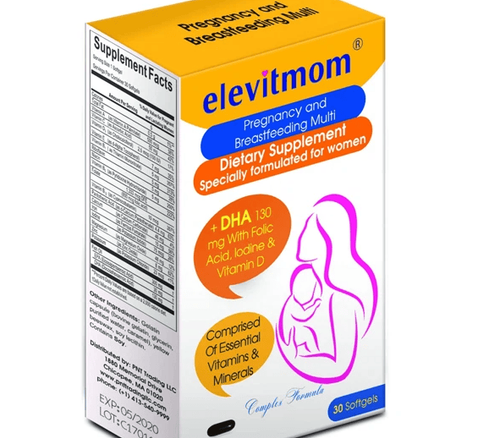This is an automatically translated article.
Hadomin Ginseng is a medicinal product that contains a variety of vitamins and minerals along with ginseng extract. The drug is prepared in the form of soft capsules, use Hadomin Ginseng daily after breakfast to bring optimal treatment effect.
1. What is Hadomin Ginseng?
Hadomin Ginseng is a medicinal product of Ha Tay Pharmaceutical Joint Stock Company, which is made in the form of a soft capsule, an oblong brown shape, with a glossy label, not sticky to the touch, inside the tablet contains brown mixture. Ingredients of the drug Hadomin Ginseng include:
Ginseng extract (Panax ginseng extract): 40mg; Vitamin A (Retinyl palmitate): 2500 IU; Vitamin D2 (Ergocalciferol): 300 IU; Vitamin B1 (Thiamine nitrate): 2mg; Vitamin B2 (Riboflavin): 2mg; Vitamin B6 (Pyridoxine.HCl): 2mg; Vitamin PP (Nicotinamide): 18mg; Vitamin C (Ascorbic Acid): 30mg; Vitamin B5 (Calcium pantothenate): 15mg; Vitamin E (œ Tocopheryl acetate): 40IU; Calcium (Calcium hydrophosphate): 45mg; Iron (Iron sulfate): 5.6mg; Magnesium (Magnesium Oxid): 19.8mg; Zinc (Zinc oxide): 4.02mg; Copper (Copper sulfate): 1.78mg; Manganese (Manganese sulfate): 0.98mg; Potassium (Potassium sulfate): 8.08mg.
2. What is the effect of Hadomin Ginseng?
Hadomin Ginseng is used to provide vitamins and mineral salts to the body, helping patients recover after getting sick. The drug is used for people with chronic diseases, patients after surgery and cases of fatigue, loss of appetite, weakness due to studying, playing sports, and lactating women. vitamin and mineral deficiencies.
3. Dosage of Hadomin Ginseng
Drink Hadomin Ginseng as directed by the doctor with the usual dose of 1 tablet / day, should take Hadomin Ginseng after breakfast.
4. Contraindications of Hadomin Ginseng
Contraindicated to use the drug in case of hypersensitivity to one of the components of the drug Hadomin Ginseng; Pregnant women; Vitamin A: Contraindicated in patients with excess vitamin A; Vitamin D2: Contraindicated in hypercalcemia or vitamin D toxicity; Vitamin PP: Contraindicated in severe liver disease, progressive peptic ulcer, arterial bleeding, severe hypotension; Vitamin C: Contraindicated to use high doses of vitamin C for people with glucose - 6 - phosphate dehydrogenase (G6PD) deficiency, kidney stones (high dose 1g/day).
5. Undesirable effects of Hadomin Ginseng
Ginseng: Taking ginseng for a long time (for 2 years) or using ginseng in large doses can lead to high blood pressure, nervous hypersensitivity, insomnia, skin rash, diarrhea.. All of these syndromes are called ginseng abuse syndrome.
Long-term intake of high doses of vitamin A can lead to vitamin A poisoning with typical symptoms: fatigue, excitability, loss of appetite, weight loss, vomiting, digestive disorders, fever, liver - spleen enlarged, discolored skin, hair loss, cracked and bleeding lips, anemia, headache, high blood calcium, edema under the skin, joint pain. In children, symptoms of chronic vitamin A toxicity include increased intracranial pressure (stretch fontanelle), papilledema, tinnitus, visual disturbances, and painful swelling along the long bones, however most symptoms gradually disappears when the drug is stopped. Taking high doses of vitamin A can lead to acute poisoning with signs of toxicity including: drowsiness, dizziness, lightheadedness, nausea, vomiting, excitability, headache, delirium, convulsions, and diarrhea. bleeding ... appears after taking the drug from 6 - 24 hours. For pregnant women, using doses of Vitamin A above 8,000 IU per day can cause toxicity to the fetus in the womb.
Taking Vitamin D: may cause unwanted effects such as drug overdose, vitamin D poisoning. The initial symptoms of vitamin D poisoning are signs of hypercalcemia. Hypercalcemia and vitamin D intoxication have some common side effects such as weakness, fatigue, somnolence, headache, loss of appetite, dry mouth, nausea, constipation, diarrhea, tinnitus manifestations. ear, ataxia, hypotonia, myalgia, bone pain, and excitability. Less common or rarer side effects associated with vitamin D include: Renal calcium infection, renal dysfunction, osteoporosis, growth retardation in children, weight loss, hypertension, arrhythmias, and metabolic disturbances. ...
Vitamin B1: Very rare and usually in an allergic fashion, occurs mainly when injected.
Vitamin B5: can cause allergic reactions but quite rare.
Vitamin B2: urine may be yellow because it contains Vitamin B2 and cause some urine tests to be wrong, when stopping the drug, it will disappear.
Vitamin B6: Doses of 200mg/day and long-term (over 2 months) may cause peripheral neuropathy with unsteady gait, frostbite, frostbite and hand clumsiness which is reversible upon discontinuation of vitamin B6. medication, although it still leaves sequelae.
Vitamin E: High doses of vitamin E can cause diarrhea, abdominal pain, digestive disorders, fatigue, and weakness.
Vitamin C: High doses of 1g vitamin C/day can cause urinary tract disorders, blood disorders in people with G6PD deficiency causing hemolysis, nausea, vomiting, heartburn, abdominal cramps, fatigue.
Vitamin PP: Small doses are usually not toxic, but when used in high doses, some common side effects can occur: nausea, flushing of the face and neck, itching, burning sensation, stinging or stinging pain in the skin. skin, less commonly progressive peptic ulcer, vomiting, loss of appetite, pain on hunger, flatulence, diarrhea, dry skin....
6. Drug interactions of Hadomin Ginseng
Vitamin B6 contained in Hadomin Ginseng will inhibit the effect of Levodopa (due to peripheral dopadecarboxylase preference). Hadomin Ginseng should not be used with Neomycin, Cholestyramine, Liquid Paraffin because these drugs will reduce the absorption of vitamin A. Oral contraceptives may increase the concentration of vitamin A in the blood plasma and have an unfavorable effect on the absorption of vitamin A. conception. Concomitant use of Hadomin Ginseng with isotretinoin can lead to a condition similar to that of an overdose of vitamin A, so the concomitant use of these two drugs should be avoided.
Hadomin Ginseng should not be used concurrently with Cholestyramine or Colestipol hydrochloride, as it may lead to decreased intestinal absorption of vitamin D. Concomitant treatment with thiazide diuretics in patients with hypoparathyroidism may lead to hypercalcemia in which case the drug should be temporarily discontinued. Do not administer with Phenobarbital and/or Phenytoin as these drugs may decrease plasma concentrations of 25-hydroxy ergocalciferol and 25-hydroxy-cholecalciferol and increase the metabolism of vitamin D to inactive substances. Hadomin Ginseng should not be used with corticosteroids because corticosteroids interfere with the action of vitamin D. Do not use Hadomin Ginseng with cardiac glycosides because the toxicity of cardiac glycosides increases due to hypercalcemia, leading to arrhythmias.
7. What are the warning signs of an overdose of Hadomin Ginseng?
Vitamin E (Using more than 3000U1/day) can cause digestive disorders (Nausea, vomiting, flatulence, loose bowel movements, necrotizing enterocolitis).
Vitamin A (Use 100,000U1/day x 10-15 consecutive days, or pregnant women use more than 8000UI/day) causing itchy, dry hair, loss of appetite and nausea.
Taking high doses of vitamin C (Over 1g/day) causes kidney stones.
Above is important information about the drug Hadomin Ginseng. Taking the right amount and the right dose as prescribed by the doctor will help the drug in treatment achieve the best results for the patient.
Please dial HOTLINE for more information or register for an appointment HERE. Download MyVinmec app to make appointments faster and to manage your bookings easily.




